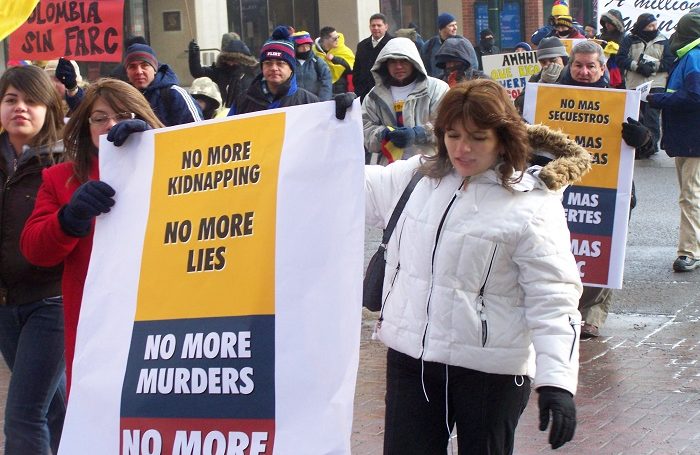
Just this month, millions of Colombians head to the polls to elect their next president. This is a remarkable period for Colombia, especially because this is the first national election since the government of President Juan Manual Santos and the Revolutionary Armed Forces of Colombia (FARC) Rodrigo Londoño agreed to the peace accord in November 2016. Since then, political optimism for Colombia’s future has gained traction, while Colombians try to learn from several decades of armed conflict and hostility between the state and the FARC rebels.
Yet, the Colombian state has yet to fully uphold justice for the thousands of civilian lives killed in the context of armed clashes against the FARC rebels. Abusive military officers still enjoy impunity for the killings of thousands of unarmed civilians.
As shown in my recently published research in a leading academic journal, besides domestic factors within Colombia, American foreign aid and policy discourses under the Bush administration facilitated the numerous human rights abuses that occurred in the context of Colombia’s post-9/11 war on drugs — or the government’s fight against narco-terrorism.
More than anything else, the sudden increase in violent state repression requires a compelling set of justifications, arguments, and an overarching ideology in order to radically depart from the status quo. In the case of post-9/11 global war on terror, the Bush administration upheld that militaristic and coercive instruments of repression were necessary to combat non-state terrorism. US allies — including Pakistan, Thailand, Saudi Arabia, to name a few —supported the idea that combating non-state terrorism requires apolitical strategy based on the overarching logic of violent state repression and military security. To quell violent political dissidence, states have to embolden military and police forces, consequently undermining terrorists through the grand showmanship of even more threatening instruments of state violence.
In post-9/11 Colombia, the government of President Alvaro Uribe warmly received the sudden increase of US military aid that was deemed necessary back then to finally quell FARC rebels. At that time, the FARC constituted around 17,000 armed rebels, and the US government formally classified the Colombian armed group as a terrorist organization. US and Colombian officials promoted the idea that groups involved in illegal drug production and trafficking perpetrated a wide array of terrorist activities. Such a causal idea gave birth to the term ‘narco-terrorism’, a very appealing and powerful term that the Colombian government used in order to justify the US-funded war on drugs. Essentially, the goal was to embolden the Colombian national security state that conscripts the military in domestic crimes such as counter-terrorism and combating illegal drugs.
To justify violent state repression amid increasing human rights abuses, the Uribe-led government inaugurated his ‘Democratic Security’ strategy, which makes the state’s human rights obligations conditional upon establishing state security through militaristic means. That strategy required bolstering the coercive capabilities of Colombian armed forces and police agencies, even if the consequence of such a policy constituted many collateral and intended human rights abuses.
Implicated in the widely known ‘false positives’ scandal, Colombian soldiers in more than 180 army units allegedly implemented around 5,700 extrajudicial killings of unarmed civilians between 2000 and 2010. In fact, Colombia’s armed forces killed far more unarmed civilians than armed rebels during the term of President Alvaro Uribe in the years 2002 to 2010. Even worse, commanding military officers incriminated in the killings have succeeded in securing high-ranking posts in the armed forces and have clearly evaded any form of judicial persecution. Cash incentives fueled this killing spree of Colombian state agents, who were promised 1,500 USD for producing evidence of the death of an armed rebel. Specifically, Colombian state forces targeted and forcibly relocated many poor and other vulnerable Colombians into FARC-dominated territories. In doing so, soldiers killed these civilians, who were made to appear as FARC rebels. US military aid fueled the Colombian state apparatus that made the killing spree possible.
While the current occupant in the Oval Office has been quite committed to deep cuts in foreign aid, US foreign aid to Colombia for 2018 is likely to remain stable compared to recent years and is pegged at around 391 million USD, thereby making it one of the biggest recipients worldwide. Although such an amount of aid represents US support for the peace accord in 2016, with around 143 million USD allocated for human rights promotion, the successor of President Santos has to use such aid and domestic resources to bring the perpetrators of abuses into justice. The effective and efficient prosecution of human rights violators within the Colombian state is a clear step towards peace. Indeed, the integrity of the peace deal and Colombia’s political future depend on how the country deals with its violent past through the mechanisms of transitional justice and criminal accountability.
Aid is neither good nor bad for human rights. Rather, the ideas, political strategies, and normative justifications shape foreign aid’s political consequences in recipient countries. If politicians and state officials deem that human rights are subservient to state security, then foreign aid and domestic resources are likely to generate human rights abuses. The goal is to defeat those shared and emerging ideas that any human individual’s right to life is subservient to the powerful actor’s claim for upholding public security.
Further Reading on E-International Relations
- Colombia’s New Presidency and the Protection of Social Leaders
- Elections in Colombia: Return of Uribism and Uncertainty of the Peace Process
- Contesting Impunity in Colombia
- Colombia at the Crossroads? The Road Ahead in an Election Year
- Peace under Siege? Ivan Duque’s Election and the FARC
- Colombia’s ‘Total Peace’ and Climate Change